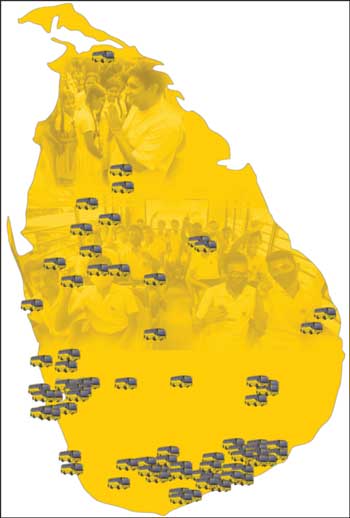Monday Feb 23, 2026
Monday Feb 23, 2026
Tuesday, 12 September 2023 00:01 - - {{hitsCtrl.values.hits}}
 “Education is the passport to the future, for tomorrow belongs to those who prepare for it today” – Malcom X
“Education is the passport to the future, for tomorrow belongs to those who prepare for it today” – Malcom X By Manique Mendis
Mothers, fathers and teachers were engaged in serious discussion. Their happiness eclipsed the acute economic problems they faced. They were filled with gratitude. They were filled with hope. They were convinced at last that their dreams for their precious children could be realised!
The object of their discussion and centre of their focus was a school bus. It was a brand-new bus. It made a world of difference to them.
In schools in Sri Lanka where the majority of students came from low-income families, parents grapple with myriad problems in providing books, stationery, uniforms, shoes, meals and other basic needs for their children.
Such parents cannot afford the luxury of meeting the high costs of transport for children to take part in extra-curricular activities, competitions, educational excursions and special events in locations far away from the school premises.
There are many school events at district, provincial and national level that the children are selected to participate in.
Unfortunately, however talented the children may be, the parents can only afford to eke out their meagre income to send their children for few external events. The children thus lack the opportunities to maximise their potential to shine.
A school bus may be envisaged by more fortunate members of society as something mundane and not essential for an economically disadvantaged school.
However, the receipt of a gift of a magnificent new bus to such a school, is a transformational opportunity for the children, parents and teachers.
Taking ownership to safeguard and make maximum use of the bus
The parents and teachers take ownership of their new treasure. They see it as the means of opening up a whole new world of opportunity for their beloved children to participate in sports and educational activities that were hitherto mostly beyond their reach.
The parent and teachers step in to safeguard and make optimum use of the new bus. They get together and build a shed to protect it from the elements. Fathers who have licenses volunteer to drive the bus when needed. Others volunteer to clean it regularly and ensure it is kept spick and span. Parents who are mechanics oversee the maintenance and repairs.
On 27 August, the students of Reggie Ranatunga College, Minuangoda received the gift of a brand-new bus for their school. On 14 September, the students of Kalutara Muslim Maha Vidyalaya will receive their gift of a school bus.

The gift of a school bus, came through the Sakwala program of Opposition Leader Sajith Premadasa. Sakwala is an initiative by Sajith Premadasa which empowers Sri Lankan schools and schoolchildren with smart classes and computers in order to gear them up for the digital revolution. Sakwala also makes provision for the donation of buses to needy schools. This program was implemented by Premadasa in pursuance of his mission in investing in education for the future of Sri Lanka, empowering children from all strata of society.
The bus gifted to Reggie Ranatunga College was the 76th bus gifted to a school under the Sakwala program. Kalutara Muslim Maha Vidyalaya will receive the 77th bus.
Transparent process motivating private donors
“The buses are donated by international and national donors who are convinced about Sajith Premadasa’s ability to lead and develop Sri Lanka,” said a recent donor of a bus who wanted to remain anonymous.
He went on to explain that the process of donation is transparent and devoid of middlemen.
“I paid the fee to buy the bus, directly to the vendor. The school welcomed the gift with great joy. They arranged for it to be blessed by religious dignitaries and invited Sajith Premadasa for a ceremony they organised to receive it officially,” he explained.
Philanthropists who see for themselves the transformation of lives of children with the gift of the school bus, are motivated to donate buses, adding to Sajith Premadasa’s vision to donate 100 buses to needy schools before long.
Even as Sri Lanka is grappling with an economic and political crisis, it is indeed encouraging to witness how bright young children from poverty-stricken families are being given a hand through the Sakwala program to maximise their talents and emerge as young leaders who will take over the reins of Sri Lanka someday.